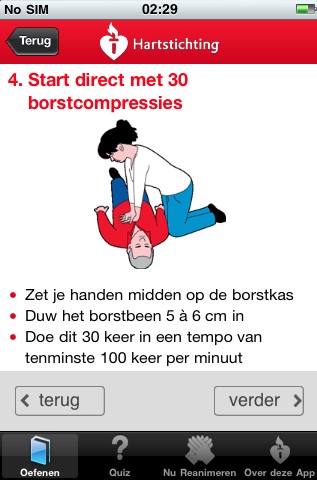 Reanimatie, a Dutch CPR app.
Reanimatie, a Dutch CPR app.
According to the American Heart Association, 70 percent of Americans either lack CPR training or their training is lapsed enough that they don't feel qualified to help in an emergency. In Germany, surveys have found that only one in five bystanders would step up and administer CPR in an emergency. Smartphone apps could potentially help alleviate that gap by giving people instructions in the moment. But currently available apps, by and large, won't cut it, according to a recent study.
A group of Dutch researchers has found that out of 61 apps available to help non-experts perform CPR, only five both met the approval of physician evaluators and fared well in usability testing with untrained subjects.
"Smartphones and easy-to-learn approaches like 'compression-only CPR' seem to match well: situational support and easily accessible information (i.e., apps) can be provided in all situations," the researchers wrote. "Often-mentioned reasons for low rates of bystander CPR (eg, fear and lack of knowledge) might be alleviated by these supporting devices resulting in more laypeople being motivated to perform CPR. In contrast, teaching obsolete guidelines or giving too detailed information could deter the public from performing CPR or lead to worse CPR quality."
Starting with 61 apps found in the iOS and Google Play stores, the researchers eliminated 15 apps that were focused on pediatric CPR or CPR for pets. A pair of board-certified physicians then looked for three features they determined to be a baseline for a safe and effective CPR app: training features, conformity with CPR guidelines from the European Resuscitation Council and the American Heart Association, and emergency support. Only 13 apps met all three of the criteria. Three quarters of them (35 apps) included emergency support, while only 35 percent (16 apps) followed the ECR and AHA guidelines.
Seven apps had the capacity to call emergency services directly from inside the app, a feature researchers deemed important but not essential. Only one app, Pocket CPR, had real-time feedback via an accelerometer and only one app, FDNY Lifesaver Beta V1.0, offered GPS location.
Researchers brought in subjects to do usability testing on the 13 apps that met the minimum criteria. The 14 volunteers had a mixture of experience levels with both CPR and mobile apps. Subjects tried out apps and rated them on a Likert scale for learnability and usability. Five apps tested above the 50th percentile on the usability scale. Reanimatie, a Dutch app, scored the highest with a mean System Usability Scale score of 82, though the researchers acknowledged this could have been partly attributable to a language bias at the Dutch university where the study was conducted.
"This study has shown [the] availability of a multitude of mobile apps for CPR training and real incident support in the largest mobile app markets," researchers concluded. "Unfortunately, only a few follow recent guidelines, are designed with acceptable usability, and are easy to learn for non-expert users. While mobile phones are increasingly integrated into the chain-of-survival, the wide usage of mobile apps for resuscitation training and real incident support cannot be recommended without caution at this point of time."


















